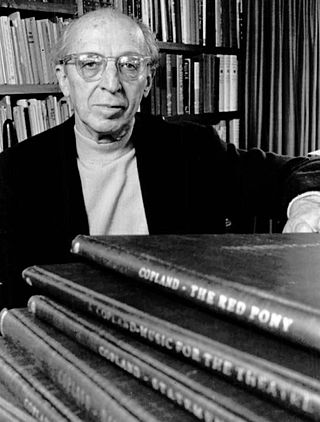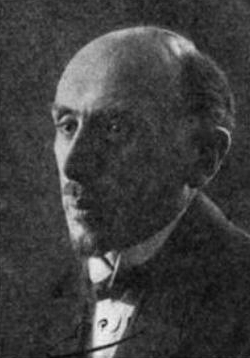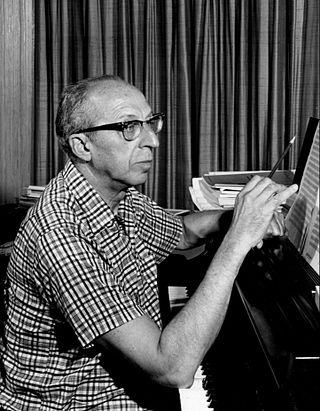Related Research Articles

Aaron Copland was an American composer, critic, writer, teacher, pianist and later a conductor of his own and other American music. Copland was referred to by his peers and critics as the "Dean of American Composers". The open, slowly changing harmonies in much of his music are typical of what many people consider to be the sound of American music, evoking the vast American landscape and pioneer spirit. He is best known for the works he wrote in the 1930s and 1940s in a deliberately accessible style often referred to as "populist" and which the composer labeled his "vernacular" style. Works in this vein include the ballets Appalachian Spring, Billy the Kid and Rodeo, his Fanfare for the Common Man and Third Symphony. In addition to his ballets and orchestral works, he produced music in many other genres, including chamber music, vocal works, opera and film scores.

Paul Frederic Bowles was an American expatriate composer, author, and translator. He became associated with the Moroccan city of Tangier, where he settled in 1947 and lived for 52 years to the end of his life.
The City is a pioneering short documentary film from 1939 that contrasts the problems of the contemporary urban environment with the superior social and physical conditions that can be provided in a planned community. It was directed and photographed by Ralph Steiner and Willard Van Dyke based on a treatment by Lewis Mumford, which was in turn based on an outline by Pare Lorentz. Aaron Copland wrote the musical score, and Morris Carnovsky provided the narration.

Appalachian Spring is an American ballet created by the choreographer Martha Graham and the composer Aaron Copland, later arranged as an orchestral work. Commissioned by Elizabeth Sprague Coolidge, Copland composed the ballet music for Graham; the original choreography was by Graham, with costumes by Edythe Gilfond and sets by Isamu Noguchi. The ballet was well received at the 1944 premiere, earning Copland the Pulitzer Prize for Music during its 1945 United States tour. The orchestral suite composed in 1945 was played that year by many symphony orchestras; the suite is among Copland's best-known works, and the ballet remains essential in the Martha Graham Dance Company repertoire.
Lincoln Portrait is a 1942 classical orchestral work written by the American composer Aaron Copland. The work involves a full orchestra, with particular emphasis on the brass section at climactic moments. The work is narrated with the reading of excerpts of Abraham Lincoln's great documents, including the Gettysburg Address. An orchestra usually invites a prominent person to be the narrator.
Irving Gifford Fine was an American composer. Fine's work assimilated neoclassical, romantic, and serial elements. Composer Virgil Thomson described Fine's "unusual melodic grace" while Aaron Copland noted the "elegance, style, finish and...convincing continuity" of Fine's music.
Billy the Kid is a 1938 ballet written by the American composer Aaron Copland on commission from Lincoln Kirstein. It was choreographed by Eugene Loring for Ballet Caravan. Along with Rodeo and Appalachian Spring, it is one of Copland's most popular and widely performed pieces. It is most famous for its incorporation of several cowboy tunes and American folk songs and, although built around the figure and the exploits of Billy the Kid, is not so much a biography of a notorious but peculiarly appealing desperado as it is a perception of the "Wild West", in which a figure such as Billy played a vivid role.
Aaron Copland's Clarinet Concerto was written between 1947 and 1949, although a first version was available in 1948. The concerto was later choreographed by Jerome Robbins for the ballet Pied Piper (1951).
Maurice Goldman (1910–1984) was an internationally known composer and conductor. Goldman’s compositions and arrangements are largely in the areas of Yiddish and Hebraic music. However, like his mentors, Ernest Bloch and Aaron Copland, Goldman’s music breaks the boundaries of traditional Jewish melodies, employing chordal and harmonic elements found in classical, jazz, and American folk music.
Old American Songs are two sets of songs arranged by Aaron Copland in 1950 and 1952 respectively, after research in the Sheet Music Collection of the Harris Collection of American Poetry and Plays, in the John Hay Library at Brown University. Originally scored for voice and piano, they were reworked for baritone and orchestra.
People's Songs was an organization founded by Pete Seeger, Alan Lomax, Lee Hays, and others on December 31, 1945, in New York City, to "create, promote, and distribute songs of labor and the American people." The organization published a quarterly Bulletin from 1946 through 1950, featuring stories, songs and writings of People's singers members. People's Songs Bulletin served as a template for folk music magazines to come like Sing Out! and Broadside.

Blaine Stubblefield was the founder of the National Oldtime Fiddlers' Contest held annually in Weiser, Idaho, an archiver of American folk songs, the originator of regular passenger boat tours down the Hells Canyon of the Snake River, a writer, and a magazine editor.
El Salón México is a symphonic composition in one movement by Aaron Copland, which uses Mexican folk music extensively. Copland began the work in 1932 and completed it in 1936, following several visits to Mexico. The four melodies of the piece are based on sheet music he purchased during his visits.
Rodeo is a ballet composed by Aaron Copland and choreographed by Agnes de Mille, which premiered in 1942. Subtitled "The Courting at Burnt Ranch", the ballet consists of five sections: "Buckaroo Holiday", "Corral Nocturne", "Ranch House Party", "Saturday Night Waltz", and "Hoe-Down". The symphonic version omits "Ranch House Party", leaving the other sections relatively intact.
"Bonaparte's Retreat" is the title of several related songs. Although there are several different fiddle tunes titled "Bonaparte's Retreat," the one that is most common is an American old-time tune dating back to at least the late 1800s and probably well before that. In 1950, American country music artist Pee Wee King recorded a modified version of that tune, with lyrics added, which he also called "Bonaparte's Retreat". King's version has since been covered by many country artists.
Clare (Ewing) Grundman was an American composer and arranger.

Jacob Weinberg was a Russian-born American Jewish composer and pianist who composed over 135 works for piano and other instruments. He was one of the founders of the Jewish National Conservatory in Jerusalem before immigrating to the U.S. where he became "an influential voice in the promotion of American Jewish music" from the 1940s until his death.

La hija de Cólquide is a ballet score composed by Carlos Chávez in 1943–44 on commission from the Elizabeth Sprague Coolidge Foundation for Martha Graham. The title refers to the mythological character Medea, daughter of King Aeëtes of Colchis, in the story of Jason and the Golden Fleece. The ballet spawned several subsidiary works in Chávez's catalog including his Third String Quartet. When Graham eventually choreographed it, she wrote a new scenario and gave it the title Dark Meadow.
Dance Panels is a ballet composed by Aaron Copland in 1959 for a planned collaboration with choreographer Jerome Robbins. After Copland had written the score, Robbins reneged on his commitment and the performance did not take place. Three years later, Copland revised the score for a ballet by the Bavarian State Opera in Munich, Germany, where it premiered on 3 December 1963. The ballet was performed by the New York City Ballet in 1965 and the concert version received its first performance at the Ojai Music Festival the following year. According to Copland biographer Howard Pollack, Dance Panels has proven from a musical standpoint one of the composer's more accessible late scores. While some of its more dissonant moments sound similar to Copland's twelve-tone compositions, other parts recall his earlier stage and screen music. It is also the only one of Copland's six ballets not written to a specific program.

Four Piano Blues is a collection of pieces for piano by American composer Aaron Copland. The collection was composed between 1926 and 1948.